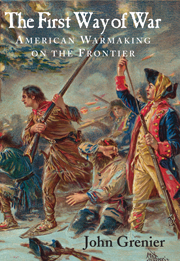Book contents
- Frontmatter
- Contents
- List of Figures and Maps
- Preface
- Acknowledgments
- List of Abbreviations
- Introduction
- 1 The First Way of War's Origins in Colonial America
- 2 The First Way of War in the North American Wars of King George II, 1739–1755
- 3 Continental and British Petite Guerre, circa 1750
- 4 The First Way of War in the Seven Years' War, 1754–1763
- 5 The First Way of War in the Era of the American Revolution
- 6 The First Way of War in the 1790s
- 7 The First Way of War and the Final Conquest of the Transappalachian West
- Epilogue
- Index
7 - The First Way of War and the Final Conquest of the Transappalachian West
Published online by Cambridge University Press: 05 June 2012
- Frontmatter
- Contents
- List of Figures and Maps
- Preface
- Acknowledgments
- List of Abbreviations
- Introduction
- 1 The First Way of War's Origins in Colonial America
- 2 The First Way of War in the North American Wars of King George II, 1739–1755
- 3 Continental and British Petite Guerre, circa 1750
- 4 The First Way of War in the Seven Years' War, 1754–1763
- 5 The First Way of War in the Era of the American Revolution
- 6 The First Way of War in the 1790s
- 7 The First Way of War and the Final Conquest of the Transappalachian West
- Epilogue
- Index
Summary
The Americans' peace terms ending the Creek War stunned the miccos of the Creek nation in the summer of 1814. As punishment for the “unprovoked, inhuman, and sanguinary war waged by the hostile Creeks against the United States,” Major General Andrew Jackson, the sole American negotiator with the Indians, demanded no less than the destruction of the Creek nation. Jackson's harshest provision, one that the Creeks had little choice but to accept, required that the Creeks give the United States 23 million acres as war reparations.
Several miccos hoped that they might persuade Jackson to accept a return to the peace of the late 1790s, one based on trade and reciprocity rather than reparations. The recently ended conflict had been as much a civil war between pro- and anti-American Creeks as a struggle between the United States and the Creek nation. Many of their people under the Creek leader William McIntosh, the miccos reminded Jackson, had joined the Americans to fight against their fellow Creeks, the Red Stick faction of the Upper and Lower Towns.
At the Treaty of Fort Jackson, however, Jackson refused to distinguish between pro-American Creeks and Red Sticks. When the accommodationist miccos prostrated themselves before him, Old Hickory remained unbending; he would brook no compromise concerning the land cessions. Jackson stated that even McIntosh's followers would have to sign away their lands. The reparations, Jackson said, were a lesson to all who might oppose the Americans.
- Type
- Chapter
- Information
- The First Way of WarAmerican War Making on the Frontier, 1607–1814, pp. 204 - 220Publisher: Cambridge University PressPrint publication year: 2005



